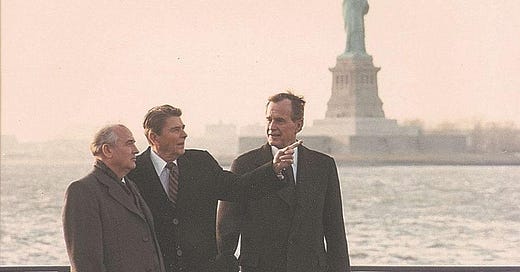They are all gone now. The moment in time when they were center stage, when it actually seemed that a new world order was in prospect is so over.
With the passing of Mikhail Gorbachev at ninety-one, his legacy is the failure of an extraordinary effort at a revolution in place, changing the USSR from an autocracy to something else, “socialism with a human face,” as it was conceived in Czechoslovakia until a Soviet invasion crushed it in 1968.
Vladimir Putin’s rule has in many ways revived the norms of last century’s Bolsheviks, except before his Ukraine war there was glitz – mansions, superyachts cruising the world with oligarch owners – all in all, vulgar glamour.
Now Moscow is a place where a top Lukoil executive could fall out of a window, the latest person from the country’s energy sector to come to a sudden demise.
So, what went wrong in Russia and the United States over the past thirty-one years?
Russia:
The scale of upheaval in the 1980s was vast. In the span of about six years, the USSR completely unraveled, with its fifteen constituent republics and the satellites of Eastern Europe going their own way, reordering life with, incredibly, almost no violence. A victory for the West! Ronnie and Poppy were Cold War conquerors. There was Gorby mania, a phenomenon Maureen Dowd recently recalled in The New York Times.
And then the shattered empire had to start over without a template. For a decade there was Russian democracy of a sort, with accompanying chaos. The other nations that were once Kremlin acolytes created their own systems, from Estonia to Kyrgyzstan.
In 2000 Putin took over from an exhausted Boris Yeltsin. Putin considered the downfall of the USSR a catastrophe that he intended to redress. He made progress towards his initial goal of a Slavic conglomerate encompassing Russia, Belarus, and Ukraine, with nuclear arms, energy resources, and no discernible democracy. Only Ukraine’s fierce defiance now stands in his way.
The United States of America:
In the 1980s, inspired by the misleadingly genial Ronald Reagan and preparing the way to Newt Gingrich’s template for future MAGA doctrine, the Contract with America, the country proceeded to divide: red and blue, Black and white, north and south, east and west, as it had in centuries past.
George H.W. Bush was an old-fashioned Republican – Greenwich, Yale, a war hero, last of his breed. He was less an ideologue than a pragmatist. He raised taxes. And in 1989, after the Chinese crushed a popular uprising in Tiananmen Square, Bush sent his national security adviser to Beijing to patch things up. After winning the Gulf War and riding high in the polls, he lost to Bill Clinton, the charmer from Arkansas.
The U.S. was so sure of itself in the 1990s that it could abide an historic political crisis because the president lied about sex with an intern. Where there is peace and prosperity, there is ample space for bread and circuses.
Then came 9/11 and the wars in Iraq and Afghanistan. The Democrats chose as standard bearers in 2008, 2012, and 2016 Barack Hussein Obama, a Black man, and Hillary Clinton, a formidable woman. This, it is now clear, drove tens of millions of Americans berserk enough to support Donald J. Trump, our Mussolini, despite his proven record of grift, malfeasance, and sinister instincts.
Is China a factor?
Deng Xiaoping gave his nation communism with a capitalist soul, which his successor Xi Jinping has redefined, elevating China to a global power with intentions and consequences as yet unknown.
Could it have been different?
Gorby, Ronnie, and Poppy were all men of the moment. And what has happened in their aftermath is the resurgence of embedded national characteristics. In the U.S. there is the tug-of-war among nativism, populism, progressivism, and the conflict between the states and the federal government that has been part of the American story from the outset.
In Russia, even a casual reading of its history connects today with the past: a tsar-like leader, a small elite, and a largely subdued proletariat spanning an enormous landmass. You can take communism out of Russia. But you can’t take Russians out of Russia.
In the twenty-first century, the United States and Russia have reverted to type, nuclear-armed adversaries with political systems that for now are entrenched and fundamentally incompatible.
And what about Gorbachev’s legacy?
Failure is measured in many ways. There has been an outpouring of reflection. One of the very best was the obituary in The Economist (paywall), which ends with this paragraph:
When (Gorbachev’s wife) Raisa was diagnosed with leukemia, he accompanied her to a German clinic to hold her in his peasant’s arms. Soon after burying her, he appeared at a backstage party at the Moscow Art Theater. An actor called on the ex-president to read or sing something. Everyone froze with embarrassment, except Mr. Gorbachev. The crowd gave him space, and he sang Lermontov’s poem “Alone I set out on the road. The flinty path is sparkling in the mist.”







Thanks. Appreciated.
Terrific column, nicely written, perfect pitch and wisely crafted.